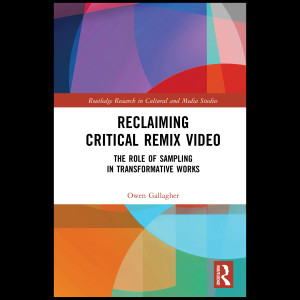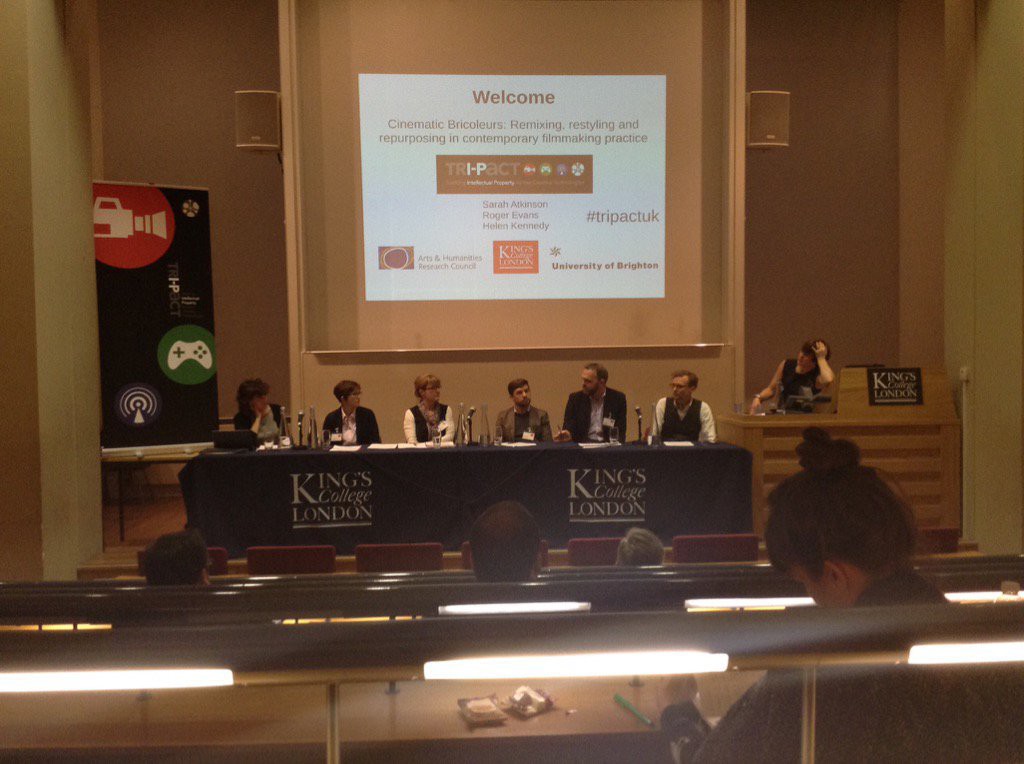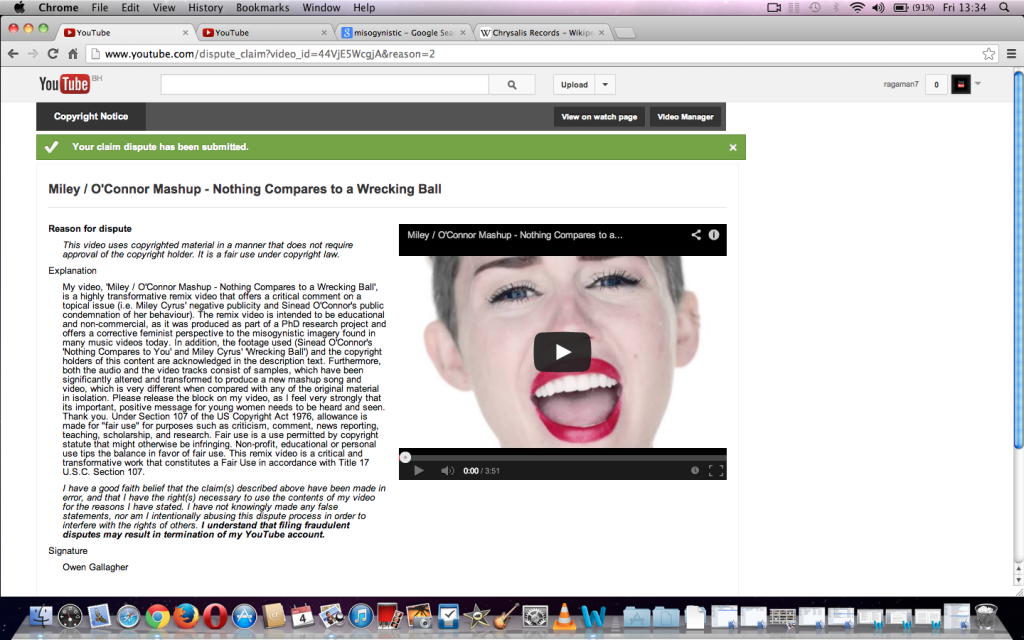Congratulations Michael D! President of Ireland for another term, starting 11th Nov. 2018. Keep up the great work! President Michael D. Higgins v Rubber Bandits-Horse Outside Remix
Author Archives: ragaman7
Reclaiming Critical Remix Video Book (Routledge, 2017) Finally Published!
My new book has finally been published! The title is Reclaiming Critical Remix Video: The Role of Sampling in Transformative Works (Routledge, 2017) by Owen Gallagher.
Description: Remix is now considered by many to be a form of derivative work, but such generalizations have resulted in numerous non-commercial remixes being wrongfully accused of copyright infringement. Gallagher argues, however, that remix is a fundamentally transformative practice. The assumption that cultural works should be considered a form of private property is called into question in the digital age; thus, he proposes an alternative system to balance the economic interests of cultural producers with the ability of the public to engage with a growing intellectual commons of cultural works. Multimodal analyses of both remixed and non-remixed intertextual work, with a particular focus on examples of critical remix video, fuel the discussion, synthesizing a number of investigative methods including semiotic, rhetorical and ideological analysis.
https://www.amazon.com/Reclaiming-Critical-Remix-Video-Transformative/dp/1138285269
Remix/Fair Use Video by Kirby Ferguson
YouTube Movie Parodies Causing Controversy in Taiwan
A Taiwanese YouTuber, Chung Wei-Ding (a.k.a AmoGood), is facing charges of copyright infringement from local Taiwan-based production companies who claim that his sampling of their films in his parody review videos violates their copyright. AmoGood has almost a million subscribers on YouTube and he also reviews Hollywood blockbusters in a similar vein to Screen Junkie’s Honest Trailers. He is claiming fair use, but apparently local copyright law under which he is governed in Taiwan, does not have a provision for fair use in the same way as U.S. copyright law does. If AmoGood is on the losing end of this legal battle, it could set a more restrictive precedent for anyone wishing to sample and remix copyrighted material into transformative works in East Asia. Will be watching the outcome of this case with interest.
[Source: http://mashable.com/2017/04/28/taiwanese-youtuber-amogood/#B4Qlh04Nz5qP ]
Summary of ‘Cinematic Bricoleurs’ Remix Conference, King’s College, London (Jan.2016)
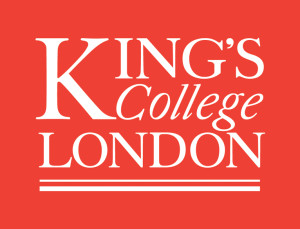 I recently had the pleasure of speaking at a conference in King’s College, London, entitled ‘Cinematic Bricoleurs: Remixing, Restyling and repurposing in contemporary filmmaking practices.’ It was a fascinating gathering of minds, full of stimulating conversations, which I hope will develop into fruitful collaborations in the future. The event was organized by Dr. Sarah Atkinson, Helen Kennedy, Roger Evans and Hilary Williams, in collaboration with the University of Brighton, as part of the TRIPACT project, funded by the AHRC.
I recently had the pleasure of speaking at a conference in King’s College, London, entitled ‘Cinematic Bricoleurs: Remixing, Restyling and repurposing in contemporary filmmaking practices.’ It was a fascinating gathering of minds, full of stimulating conversations, which I hope will develop into fruitful collaborations in the future. The event was organized by Dr. Sarah Atkinson, Helen Kennedy, Roger Evans and Hilary Williams, in collaboration with the University of Brighton, as part of the TRIPACT project, funded by the AHRC.
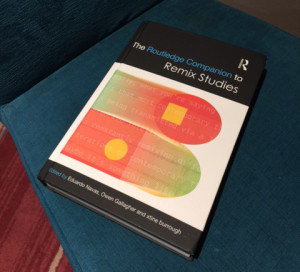 I was first to speak, with a lecture entitled ‘Rethinking Intellectual Property: In Defence of the Right to Remix’ (Gallagher, 2016). My talk focused on the conflict between the commercial culture industry and remixers who wish to sample copyrighted material without permission. I discussed the dominant justifications for considering cultural works to be a form of property (effort, scarcity and economic value) and disputed each of these, promoting instead the claim that cultural works are not property, but rather copyright is a temporary monopoly held by the creator of a cultural work. I discussed the Right2Remix initiative and proposed that the fair use exemption in US copyright law should be expanded to explicitly include all forms of non-commercial remix. I deconstructed elements of current US copyright law, arguing that the only aspect still relevant in the digital age is the right to sell, rent or lease a copyrighted work. Finally, I proposed an alternative system to copyright, which I call the ‘Right-to-Profit’ system (R2P), that would require online registration; would last for an initial 15 year term; and is renewable up to a maximum of 90 years, with an escalating renewal fee for each successive term. Under the proposed system, all non-commercial uses of protected works are explicitly permissible, as the sole right that is protected is the right to profit financially. A number of questions were asked in the Q&A section, such as whether or not remixers would be required to attribute or credit the original creators of the sampled work. In response, I suggested that remix works are explicit about their borrowing, unlike many ‘original’ works – a sampled film clip is instantly recognizable to anyone who has seen the source material – thus attribution is not essential, although it may be desirable.
I was first to speak, with a lecture entitled ‘Rethinking Intellectual Property: In Defence of the Right to Remix’ (Gallagher, 2016). My talk focused on the conflict between the commercial culture industry and remixers who wish to sample copyrighted material without permission. I discussed the dominant justifications for considering cultural works to be a form of property (effort, scarcity and economic value) and disputed each of these, promoting instead the claim that cultural works are not property, but rather copyright is a temporary monopoly held by the creator of a cultural work. I discussed the Right2Remix initiative and proposed that the fair use exemption in US copyright law should be expanded to explicitly include all forms of non-commercial remix. I deconstructed elements of current US copyright law, arguing that the only aspect still relevant in the digital age is the right to sell, rent or lease a copyrighted work. Finally, I proposed an alternative system to copyright, which I call the ‘Right-to-Profit’ system (R2P), that would require online registration; would last for an initial 15 year term; and is renewable up to a maximum of 90 years, with an escalating renewal fee for each successive term. Under the proposed system, all non-commercial uses of protected works are explicitly permissible, as the sole right that is protected is the right to profit financially. A number of questions were asked in the Q&A section, such as whether or not remixers would be required to attribute or credit the original creators of the sampled work. In response, I suggested that remix works are explicit about their borrowing, unlike many ‘original’ works – a sampled film clip is instantly recognizable to anyone who has seen the source material – thus attribution is not essential, although it may be desirable.
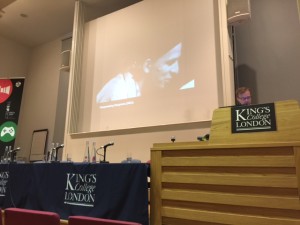 Next up was Richard Misek, who gave a talk entitled ‘Trespassing Cinema: ‘Stealing’ as creative practice.’ Richard mentioned his found footage film ‘Rohmer in Paris’, which has been doing the rounds at film festivals around the world. The primary question asked by Misek was ‘what does it mean for a filmmaker to steal an image?’ Keeping within the rhetorical language of sampling as ‘theft’, it was proposed to consider sampling as ‘trespassing’ rather than ‘stealing.’ This is an interesting proposition, however it tends to reinforce the metaphor of cultural works as property or land, as well as aligning with the language used by the culture industry to reinforce the concept of intellectual property, which still implies an element of wrong-doing on the part of the ‘trespasser.’
Next up was Richard Misek, who gave a talk entitled ‘Trespassing Cinema: ‘Stealing’ as creative practice.’ Richard mentioned his found footage film ‘Rohmer in Paris’, which has been doing the rounds at film festivals around the world. The primary question asked by Misek was ‘what does it mean for a filmmaker to steal an image?’ Keeping within the rhetorical language of sampling as ‘theft’, it was proposed to consider sampling as ‘trespassing’ rather than ‘stealing.’ This is an interesting proposition, however it tends to reinforce the metaphor of cultural works as property or land, as well as aligning with the language used by the culture industry to reinforce the concept of intellectual property, which still implies an element of wrong-doing on the part of the ‘trespasser.’
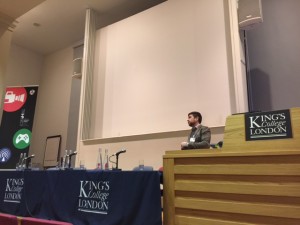 Third to speak was Dan Herbert, with a talk entitled ‘Curious Connections: The Historical and Technical Links between Media Metadata and IP Control.’ This was a fascinating overview of the history and development of Macrovision (now Rovi) and Gracenote, two of the most prominent metadata companies in existence, and how they became intertwined with the process of applying digital restrictions to various media formats at the behest of the culture industry, to protect against copyright infringement. Dan is the author of ‘Videoland’ and is currently working on a large-scale remix film focusing on representations of the video store in contemporary popular culture. Dan also described the relatively recent measures adopted by YouTube to monetize remixes by placing ads in and around the content, whereby revenue goes to the original copyright holder and not to the remixer, without requiring the remixer’s permission. This is an interesting method of generating additional revenue streams for copyright holders, but remains ethically questionable, especially in cases where a remixer feels strongly that they would rather their work remain non-commercial.
Third to speak was Dan Herbert, with a talk entitled ‘Curious Connections: The Historical and Technical Links between Media Metadata and IP Control.’ This was a fascinating overview of the history and development of Macrovision (now Rovi) and Gracenote, two of the most prominent metadata companies in existence, and how they became intertwined with the process of applying digital restrictions to various media formats at the behest of the culture industry, to protect against copyright infringement. Dan is the author of ‘Videoland’ and is currently working on a large-scale remix film focusing on representations of the video store in contemporary popular culture. Dan also described the relatively recent measures adopted by YouTube to monetize remixes by placing ads in and around the content, whereby revenue goes to the original copyright holder and not to the remixer, without requiring the remixer’s permission. This is an interesting method of generating additional revenue streams for copyright holders, but remains ethically questionable, especially in cases where a remixer feels strongly that they would rather their work remain non-commercial.
 After lunch, Desiree D’Alessandro gave a talk entitled ‘Remix Video: Tranformation and Tribulation’, during which we enjoyed numerous examples of remix video, categorized under the headings ‘Addition’, ‘Subtraction’ and ‘Exchange’. Desiree described the Fair Use app, made available by newmediarights.org and discussed how the three categories mentioned are various ways to use sampled content to produce remix videos. Additive remix, such as the Raining Men: Avengers remix, are those that add new content to an existing piece of content to produce something new. Subtractive remix, such as the Trump vs Mexico remix, are those that remove elements from the original source material to create a recut version with a new meaning. Finally, exchange remix, such as The Star Wars Remix, is when multiple sources are combined and mixed together, or various elements are exchanged for others to produce a new coherent whole. Desiree showed a number of entertaining examples, many of which relied on humour as their primary rhetorical device, prompting a question from the audience as to whether all remix videos are humorous. Of course, some of the examples, such as Dyran Lyons Jeremiah Wright remix, are much more dramatic and serious and do not rely on humour at all. Desiree ended her presentation by suggesting that torrent sites have now been replaced by streaming sites as sources of copyrighted material and that the DMCA exemption achieved in 2015 by the OTW enabled remixers to rip from BluRay discs legally, but that, frustratingly, it is still illegal to share the ripped material under US copyright law.
After lunch, Desiree D’Alessandro gave a talk entitled ‘Remix Video: Tranformation and Tribulation’, during which we enjoyed numerous examples of remix video, categorized under the headings ‘Addition’, ‘Subtraction’ and ‘Exchange’. Desiree described the Fair Use app, made available by newmediarights.org and discussed how the three categories mentioned are various ways to use sampled content to produce remix videos. Additive remix, such as the Raining Men: Avengers remix, are those that add new content to an existing piece of content to produce something new. Subtractive remix, such as the Trump vs Mexico remix, are those that remove elements from the original source material to create a recut version with a new meaning. Finally, exchange remix, such as The Star Wars Remix, is when multiple sources are combined and mixed together, or various elements are exchanged for others to produce a new coherent whole. Desiree showed a number of entertaining examples, many of which relied on humour as their primary rhetorical device, prompting a question from the audience as to whether all remix videos are humorous. Of course, some of the examples, such as Dyran Lyons Jeremiah Wright remix, are much more dramatic and serious and do not rely on humour at all. Desiree ended her presentation by suggesting that torrent sites have now been replaced by streaming sites as sources of copyrighted material and that the DMCA exemption achieved in 2015 by the OTW enabled remixers to rip from BluRay discs legally, but that, frustratingly, it is still illegal to share the ripped material under US copyright law.
 Dr. Francesca Coppa delivered a talk entitled ‘Six Celled Cinema: Remix and Fan Video’ in which she discussed vidders and fan vids, focusing on the origins of this creative practice and comparing its analog roots with contemporary practices in the digital age. Francesca has been involved with the Organization for Transformative Works (OTW) and was instrumental in their successful bid to expand the scope of the DMCA to enable remixers to rip from DVDs and BluRay discs. She described how this kind of change only be applied for every 3 years, so the next opportunity will be in 2018. She mentioned that they focused on ‘what harm has been done?’ in their proposal and how no one was able to show that the DMCA exemption of 2012 had caused any harm at all, thus they were able to proceed with a successful outcome in 2015. She described the difference between affirmative and transformative fan vids and how she considers them to be a form of beautiful digital poetry, as vidders really care about aesthetics. In Francesca’s opinion, despite VividCon celebrating the 30th anniversary of viding in 2005, we are still at the inception stage of remix cinema, and we will witness it coming fully to life in the coming years. She left us with a final comparison of remix with childbirth, stating that a newborn baby could be considered a remix of her parents – the DNA of her mother and father combined together to create a new life. We often hear people say ‘you have your granny’s eyes’, or your uncles’ ears, or your father’s chin. But with remix, Francesca suggests, the child would literally have her granny’s eyes, like a Frankenstein’s monster, directly sampled from her granny! Quite a graphic, but nonetheless effective, analogy.
Dr. Francesca Coppa delivered a talk entitled ‘Six Celled Cinema: Remix and Fan Video’ in which she discussed vidders and fan vids, focusing on the origins of this creative practice and comparing its analog roots with contemporary practices in the digital age. Francesca has been involved with the Organization for Transformative Works (OTW) and was instrumental in their successful bid to expand the scope of the DMCA to enable remixers to rip from DVDs and BluRay discs. She described how this kind of change only be applied for every 3 years, so the next opportunity will be in 2018. She mentioned that they focused on ‘what harm has been done?’ in their proposal and how no one was able to show that the DMCA exemption of 2012 had caused any harm at all, thus they were able to proceed with a successful outcome in 2015. She described the difference between affirmative and transformative fan vids and how she considers them to be a form of beautiful digital poetry, as vidders really care about aesthetics. In Francesca’s opinion, despite VividCon celebrating the 30th anniversary of viding in 2005, we are still at the inception stage of remix cinema, and we will witness it coming fully to life in the coming years. She left us with a final comparison of remix with childbirth, stating that a newborn baby could be considered a remix of her parents – the DNA of her mother and father combined together to create a new life. We often hear people say ‘you have your granny’s eyes’, or your uncles’ ears, or your father’s chin. But with remix, Francesca suggests, the child would literally have her granny’s eyes, like a Frankenstein’s monster, directly sampled from her granny! Quite a graphic, but nonetheless effective, analogy.
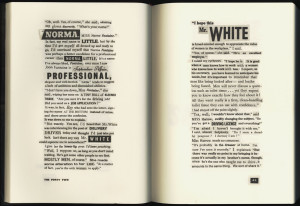 The final speaker of the conference was Graham Rawle, who shared with us a fascinating talk entitled ‘Writing with Scissors: A cut-and-paste approach to narrative design.’ Graham described how he started out as a graphic designer, illustrating for printed books. He subsequently experimented with collage art and now finds himself in the process of producing his first found footage film. Graham described how the classical 3 act narrative structure can be found in almost any sequential situation, not only in stories. He gives the example of a rollercoaster, which has a beginning, middle and end, with numerous climax points and turns in between. He also mentioned how the 3 act structure can be discerned in the analysis of a comedian’s stand-up show, a magician’s illusions and even in a fireworks display. A fascinating observation was that a typical game of snakes and ladders could be used as a blueprint or framework for the development of a narrative structure in a different medium. Graham is well-known for his ‘Lost Consonants’ series, which appeared in The Guardian for many years, whereby he would remove one letter from a sentence to change its semiotic meaning and then illustrate the new sentence using collage. Finally, Graham described the process of how he wrote the novel ‘Woman’s World’, and the fascinating life it has taken on since his decision to turn it into a film. At one point, actor James Franco was on board to act as the lead character, a transvestite named Norma, but in the end, Graham decided to go a different route and produce a film approximately based on the book, made entirely of found footage from thousands of feature films, commercials, public information shorts and television shows from the late 1950s and early 1960s. We were treated to a short test sequence Graham had been working on, which demonstrated the technique very effectively. In this example, not only is temporal montage being used, as is common with most remix videos and found footage films, but also spatial collage is employed, whereby elements from multiple clips are combined together in one frame, with occasionally unintentional humorous effects. I, for one, will be looking forward to seeing the finished film with great anticipation.
The final speaker of the conference was Graham Rawle, who shared with us a fascinating talk entitled ‘Writing with Scissors: A cut-and-paste approach to narrative design.’ Graham described how he started out as a graphic designer, illustrating for printed books. He subsequently experimented with collage art and now finds himself in the process of producing his first found footage film. Graham described how the classical 3 act narrative structure can be found in almost any sequential situation, not only in stories. He gives the example of a rollercoaster, which has a beginning, middle and end, with numerous climax points and turns in between. He also mentioned how the 3 act structure can be discerned in the analysis of a comedian’s stand-up show, a magician’s illusions and even in a fireworks display. A fascinating observation was that a typical game of snakes and ladders could be used as a blueprint or framework for the development of a narrative structure in a different medium. Graham is well-known for his ‘Lost Consonants’ series, which appeared in The Guardian for many years, whereby he would remove one letter from a sentence to change its semiotic meaning and then illustrate the new sentence using collage. Finally, Graham described the process of how he wrote the novel ‘Woman’s World’, and the fascinating life it has taken on since his decision to turn it into a film. At one point, actor James Franco was on board to act as the lead character, a transvestite named Norma, but in the end, Graham decided to go a different route and produce a film approximately based on the book, made entirely of found footage from thousands of feature films, commercials, public information shorts and television shows from the late 1950s and early 1960s. We were treated to a short test sequence Graham had been working on, which demonstrated the technique very effectively. In this example, not only is temporal montage being used, as is common with most remix videos and found footage films, but also spatial collage is employed, whereby elements from multiple clips are combined together in one frame, with occasionally unintentional humorous effects. I, for one, will be looking forward to seeing the finished film with great anticipation.
After tea, a panel was assembled for a Q&A session, featuring Prof. Charlotte Wealde, Julia Reda (Pirate Party MEP), Elizabeth Gibson (BBC), Richard Misek, Dan Herbert and myself, chaired by Helen Kennedy. The focus of the panel was ‘the currently shifting sands of territory specific intellectual property legislation, set against the wider backdrop of the global digital economy.’ Each panelist discussed their own position in relation to this issue, as well as suggesting where the leading edge is in terms of influencing changes to current IP legislation and what needs to happen to make those changes. From the floor, questions were fielded in relation to the identity and personality of the author with regard to moral rights and individual self-expression, as well as the challenge of identifying the most important issues and problems in this debate. Some of the answers yielded genuine insights, such as when Julia Reda described how recent attempts to change the EUCD to allow greater freedoms for transformative works were met with great resistance, on the grounds that such exemptions would only serve to benefit large US tech companies. It was suggested that the gathering of evidence and lots of different examples of remix should be prioritized to assist with the changing of copyright legislation and to support the case for such changes. A number of times during the discussion, reference was made to Christian Marclay and especially his found footage work ‘The Clock’ (2010), which was hailed as a superb example of the form.
Overall, I found the conference to be both interesting and encouraging and I would like to thank Sarah Atkinson and Helen Kennedy for organizing a highly successful event and for asking me to participate as one of a group of diverse speakers on such an important range of issues. I look forward to our future collaborations.
Dr. Owen Gallagher
Cinematic Bricoleurs: Remixing, restyling and repurposing in contemporary filmmaking practice
- WHEN
- WHERE
- King’s College London – Strand London WC2R 2LS GB – View Map
Hilary Williams – Organizer of Cinematic Bricoleurs: Remixing, restyling and repurposing in contemporary filmmaking practice
Hell’s Club (AMDS Films)
An impressive video remix from Antonio Maria da Silva (AMDS Films), who also brought us such gems as Terminator vs Robocop and The Fight of the Universe.
Miley Cyrus vs Sinead O’Connor Mashup Blocked Globally
Hours after uploading my new mashup video, which remixes Miley Cyrus’ ‘Wrecking Ball’ with Sinead O’Connor’s ‘Nothing Compares 2 U’, I discovered that it had been blocked globally on YouTube, as a result of a match thrown up by Google’s automatic third party copyrighted content-matching software. Both the music samples and video samples from Miley Cyrus’ ‘Wrecking Ball’ were flagged as being copyrighted by Sony Music Entertainment and so the video was blocked in every country in the world. I filed a dispute, citing reasons why the video falls under fair use, as below. Hopefully the block will be lifted so that people will be able to watch the video soon.
Explanation: My video, ‘Miley / O’Connor Mashup – Nothing Compares to a Wrecking Ball’, is a highly transformative remix video that offers a critical comment on a topical issue (i.e. Miley Cyrus’ negative publicity and Sinead O’Connor’s public condemnation of her behaviour). The remix video is intended to be educational and non-commercial, as it was produced as part of a PhD research project and offers a corrective feminist perspective to the misogynistic imagery found in many music videos today. In addition, the footage used (Sinead O’Connor’s ‘Nothing Compares to You’ and Miley Cyrus’ ‘Wrecking Ball’) and the copyright holders of this content are acknowledged in the description text. Furthermore, both the audio and the video tracks consist of samples, which have been significantly altered and transformed to produce a new mashup song and video, which is very different when compared with any of the original material in isolation. Please release the block on my video, as I feel very strongly that its important, positive message for young women needs to be heard and seen. Thank you. Under Section 107 of the US Copyright Act 1976, allowance is made for “fair use” for purposes such as criticism, comment, news reporting, teaching, scholarship, and research. Fair use is a use permitted by copyright statute that might otherwise be infringing. Non-profit, educational or personal use tips the balance in favor of fair use. This remix video is a critical and transformative work that constitutes a Fair Use in accordance with Title 17 U.S.C. Section 107.
Miley / O’Connor Mashup – Nothing Compares to a Wrecking Ball
Miley Cyrus vs Sinead O’Connor Mashup / Remix. The vocal track from Miley Cyrus’ ‘Wrecking Ball’ remixed with the music from Sinead O’Connor’s ‘Nothing Compares To You.’ Both tracks were resequenced and changed around quite a bit from the originals.
Miley Cyrus recently said that she took inspiration from Sinead O’Connor for her image and her music and then Sinead wrote a letter telling Miley to have more respect for herself and to be more mindful of the influence she has on her younger fans.
The two songs are the same tempo (60bpm) and the same relative key in major and minor (F/Dm), so they fit together pretty well. The music video is made up of clips from the official music videos for both songs as well as footage of Miley Cyrus from when she was a baby to the present day.
FAIR USE
Copyright Disclaimer
Under Section 107 of the Copyright Act 1976, allowance is made for “fair use” for purposes such as criticism, comment, news reporting, teaching, scholarship, and research. Fair use is a use permitted by copyright statute that might otherwise be infringing. Non-profit, educational or personal use tips the balance in favor of fair use. This remix video is a critical and transformative work that constitutes a Fair Use in accordance with Title 17 U.S.C. Section 107.

